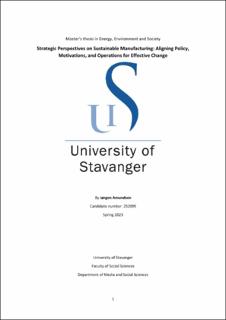| dc.contributor.advisor | Sattich, Thomas | |
| dc.contributor.author | Amundsen, Jørgen | |
| dc.date.accessioned | 2023-09-01T15:51:28Z | |
| dc.date.available | 2023-09-01T15:51:28Z | |
| dc.date.issued | 2023 | |
| dc.identifier | no.uis:inspera:153029635:96968346 | |
| dc.identifier.uri | https://hdl.handle.net/11250/3087093 | |
| dc.description.abstract | This thesis investigates the dynamics between manufacturing companies and politics in achieving sustainable production and consumption. The challenges posed by climate change, resource depletion, and waste accumulation require collective efforts across regional, national, and supranational levels. Qualitative expert interviews with sustainability representatives from the manufacturing industry provide valuable insights into their approaches to sustainability. The thesis explores the role of green industrial policy as a potential solution, examining its effectiveness in steering economic development towards sustainability. Transition Management serves as a guiding theory, categorizing strategic, tactical, operational, and reflexive activities to address societal system changes. The research aims to contribute empirical data from a firm-level perspective to the limited evidence on the effectiveness of green industrial policies. The findings highlight the need for policymakers to address challenges related to influence, profitability, and initiative. Measures such as targeted regulations, tax system alterations, public-private collaboration, risk-sharing instruments, and green public procurement policies are suggested to enhance the effectiveness of green industrial policies. The thesis underscores the importance of reflexivity and continuous policy evaluation in driving sustainable transitions. | |
| dc.description.abstract | This thesis investigates the dynamics between manufacturing companies and politics in achieving sustainable production and consumption. The challenges posed by climate change, resource depletion, and waste accumulation require collective efforts across regional, national, and supranational levels. Qualitative expert interviews with sustainability representatives from the manufacturing industry provide valuable insights into their approaches to sustainability. The thesis explores the role of green industrial policy as a potential solution, examining its effectiveness in steering economic development towards sustainability. Transition Management serves as a guiding theory, categorizing strategic, tactical, operational, and reflexive activities to address societal system changes. The research aims to contribute empirical data from a firm-level perspective to the limited evidence on the effectiveness of green industrial policies. The findings highlight the need for policymakers to address challenges related to influence, profitability, and initiative. Measures such as targeted regulations, tax system alterations, public-private collaboration, risk-sharing instruments, and green public procurement policies are suggested to enhance the effectiveness of green industrial policies. The thesis underscores the importance of reflexivity and continuous policy evaluation in driving sustainable transitions. | |
| dc.language | eng | |
| dc.publisher | uis | |
| dc.title | Strategic Perspectives on Sustainable Manufacturing: Aligning Policy, Motivations, and Operations for Effective Change | |
| dc.type | Master thesis | |
